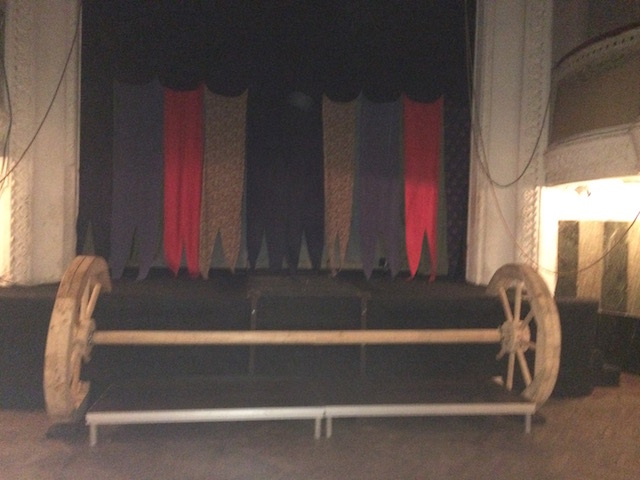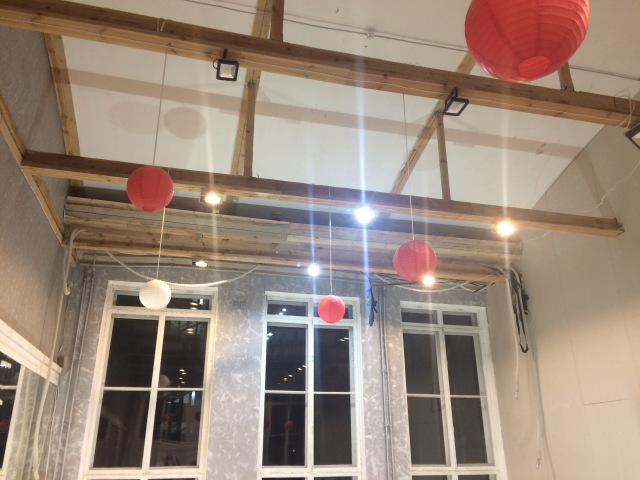This post has been sitting in my drafts for quite some time now. Thinking about online training formats and choices, I came across my notes from 2019, and… they asked me to share them 🙂
In general, I am a believer and supporter of the idea that teaching needs to be learner- and learning-centered, and that the students (or teachers in the sessions) need to be engaged in what is going on in the classroom (by ‘classroom’ here I mean lesson space, discussion board, etc.)
At the same time, as a learner (audience, participant, conference attendee, etc.) I sometimes have different thoughts and reactions. Let me share two examples here.

2019
I went to see a show in the theater in Lviv Les Kurbas Theatre. It was my first time in this theatre. My assumptions and expectations from being a show spectator is that you are sitting and watching the show. I thought about it as a ‘passive’ activity (verbally and kinesthetically) which provokes thought process and mental engagement. Actually, that idea generation and thought process was my primary goal for that night. I was very excited to get there.
What felt very different, and completely unexpected for me was how actors engaged the audience into the show (by asking questions, sometimes ‘appointing’ someone to respond, sometimes repeating the same question multiple times, if the person in the audience was not ready with an answer.) Well, it was a comedy show, so the expectation was that your response would be witty, and, in the style of the show, provoking some laughter from the audience (and actors). I was in the second row, grateful for not being at the very front.
Well, I must confess, this did not feel comfortable to me. Quite the opposite happened: instead of ‘just’ watching the show and letting my thoughts wander freely, I felt a bit of pressure and was checking if there was someone approaching me with a mike. I realized I was not making an eye contact with the actors. I was actually checking my watch and thinking about the break. I was not ‘in the momentum’ of the experience.
While wondering if it was just me feeling this way (and blamed myself for not having read more about the theater beforehand), I heard a woman’s loud comment that the actors were too close to the audience. She repeated this twice, which to me was a sign that I was not the only one not at ease.
Why was that happening? Maybe, I was older than the typical/expected watcher (the theater is aiming at young people, I guess). Maybe, it was not the right day/mood. Maybe, and most likely, being informed about the nature of the show would have helped me to what to expect.

2021
I was attending a teaching webinar. The speakers were new to me, and I was very curious about the topic. At the beginning I was asked to turn the camera off and to say hello. Then, the presenters showed the slides and started sharing their story/activity. From time to time (every 5-7 minutes), they paused slide sharing and asked us to turn the cameras on and respond, write in the chat, ask questions, etc. If someone’s camera was off (like mine), they referred to me by name and asked to turn it on. As a result, I could not make notes the way I wanted, and at this point can’t recall the exact ideas or activities from that session. I wish there was a chance to chat with the presenters (they were both amazing, had lots of cool ideas to share, and are clearly both wonderful teachers!)
Again, I must confess I was not comfortable. I take full responsibility for feeling that way: I think I was assuming that a ‘webinar’ is a less interactive genre, and that it is more about watching, typing in the chat, asking questions in the Q/A section. Maybe, it was based on my assumption that there are ‘Zoom meetings’ (where I had spent several hours on that day) and ‘Webinar rooms’, so when there is a webinar, it is a different format. Maybe, I am a less interactive person (and at this point the reader may be wondering how I got to be a teacher, right?) Or maybe I am still defining the ‘genres’ of the online interactive sessions: Webinar? Workshop? Discussion? (if you have good resources or links about these descriptions and differences, I would like to learn more!)
Thoughts, reflections, and questions
Getting back to the title of the post: does being ‘truly engaged’ always lead to being responsive in the process? Being on camera? Saying something? Do/Can my sessions offer choices for people not to start off a conversation immediately? What could some pros and cons of asking an open-ended question to the whole group? How can I inform my audience of ‘what’s coming’ to make them more comfortable and clear? And… how could feeling/being uncomfortable be useful, from time to time?
Thank you for reading!
P.S. Susan Cain’s books and TED talk were helpful to me to get more comfortable with the introverted part of my personality 🙂

Hi Zhenya
Thanks a lot for this thought-provoking post! The examples that you provided made me think about the topic of correlation between teacher’s and student’s learning preferences. I have a strong feeling (and this feeling has been proved by a lot of my CAM trainees) that a lot of teachers subconsciously transfer their own learning styles to the expected learning preferences of their students. In other words, if a teacher is an extrovert, they expect all their students to get 100% involved in the lesson and to respond actively. If a teacher is an introvert, the expectations are very often exactly the opposite. I guess one of the teacher’s tasks in class is to be well aware of the differences their learners have in their learning preferences and strategies. I am convinced this is not an easy task at all!
PS: By the way, Les Kurbas theatre is my favourite in Lviv. Have you seen their ‘Lisova Pisnia’ (Forest Song)? Strongly recommend! 🙂
LikeLiked by 2 people
Hi Andriy
Thank you for the comment! True, there is a lot of ‘subconscious transfer’ of the ways we teach/learn and eventually educate teachers. It is interesting that such perceptions may vary from the language learning process to the ‘non-language’ events and conferences. I mean, if is a language learning experience, I am much more ‘communicative’ than at the time of attending a lecture or webinar on a less familiar topic. Perhaps not everything needs to be ‘loop input’.
That said, I am grateful to the people offering their insights at webinars and other online sessions! I hope my post did not read otherwise.
Always good to connect!
Zhenya
P.S. I will definitely be back to Les Kurbas theatre after the lockdown is over (we are closed till 28 March). The ‘Forest Song’ is on my list, as I have been reading about Lesya Ukrainka a lot these days.
LikeLike
Thank you for such a detailed and descriptive post. As someone in the process of becoming a teacher (TEFL) , having spent years in the service industry working to engage employees and clients, I found it all very interesting. I am thankful for the insightful reminder that being uncomfortable can sometimes hinder our ability to learn, but also mindful that outside our comfort zone is often where we make many learning breakthroughs. One of the challenges of remote interaction is the lack of input (especially if cameras are off) so people can see other’s reactions and respond. As I plan to begin my teaching career online, I am eager to find a balance where I can still engage students even without actual in-person interaction.
Thanks again for sharing!
LikeLiked by 1 person
Thank you for reading, Happygourmand, and for your comment! You summarized my idea for this post so beautifully: ‘being uncomfortable can sometimes hinder our ability to learn, but also mindful that outside our comfort zone is often where we make many learning breakthroughs.’
I think the above is also true about our teaching job and role(s) now. Even though I have been in the physical classroom for a number of years, ‘translating’ this experience online makes me learn a lot. Sometimes it feels like doing something absolutely new!
Like you, I like thinking about the question of balance and engaging students ‘even without actual in-person interaction’. From my experience, a lot can be done using Chat Box and good questions from the teacher. And… so much more to learn in the future!
You said you worked in the service industry, and this sounds like a fantastic base and foundation for becoming a teacher. Hope we have more conversations about this in the future!
Zhenya
LikeLike
Zhenya, thanks for an interesting post. I wonder if this could be connected to teacher talking time. I find I’m often worried when I speak “too much” and yet I think my audience (i.e. my students) expect me to talk. And yet so much of our pedagogical culture makes us distrust this mode as it’s too passive. In other words, maybe we should worry less about being too literal in our definition of engagment. The audience may be silent but very much engaged. (I recognise that I haven’t addressed your idea of going outside one’s comfort zone. I used to try and push my students out of it, but as Andriy points out, this may not work well with introverts.
LikeLiked by 1 person
Hi Sean
Thank you for your thought-provoking comment!
I can certainly see the connection with teacher talking time. To me, it is much more than ‘how much’ we talk as teachers: why and when we talk, to the whole class, to a group of learners, or to someone specific.
100% agree with you: ‘the audience may be silent but very much engaged’, and there should be ways to see/measure that (I hope, but I don’t think I have a list of suggestions, as I am not teaching ‘live’ at the moment).
And as for the zone of (dis)comfort as a learner, there is so much to think about. Whole other post? I see a big difference between being a language learner, for example, and attending an (ELT or other kind of) workshop/conference, etc.
Thank you for your questions and motivation to keep thinking!
Zhenya
LikeLike